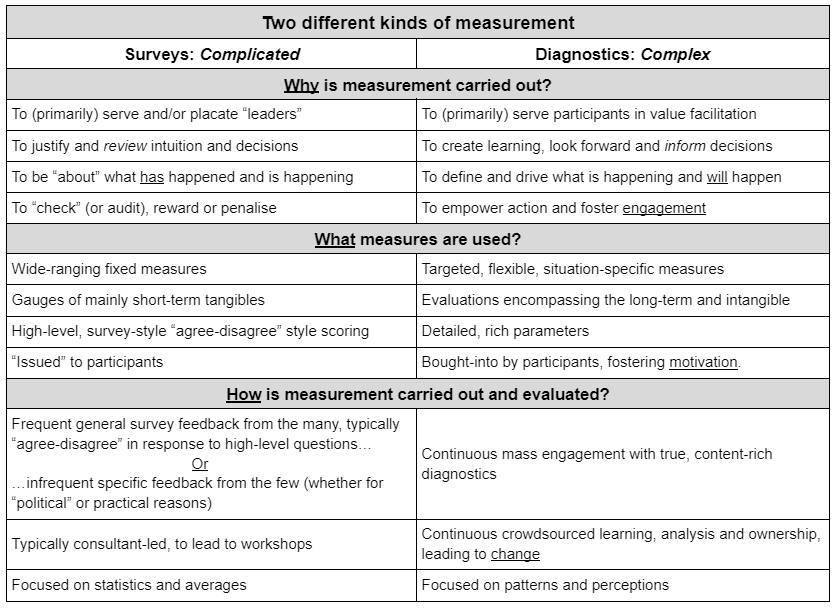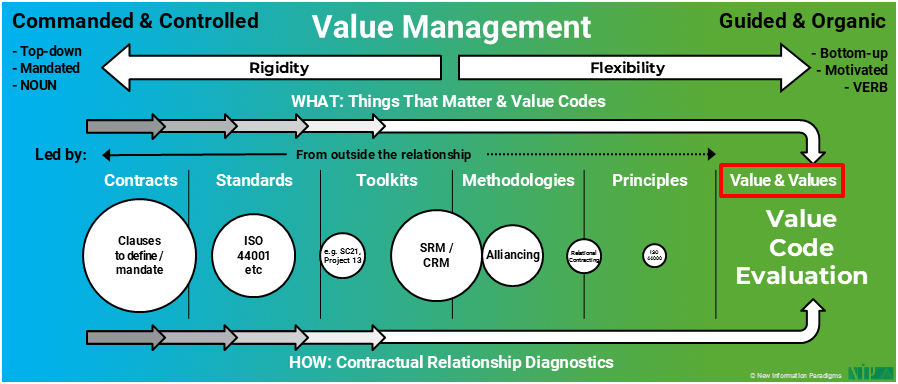Value Management: Complexity-Aware
“Complexity” and “complex” are much-used terms – typically as synonyms for things that are difficult and involve lots of elements.
And, yes, Complexity is difficult and does involve lots of elements.
But this is a woefully incomplete definition and understanding.
This is because it completely misses the explanatory and heuristic power that comes from fully grasping:
- The features of Complexity.
- The dynamics of how these features of Complexity interact with each other.
- The results that follow from these dynamics.
Likewise, whilst Complexity is part of the familiar description of today’s world as “VUCA” – Volatile, Uncertain, Complex and Ambiguous – this is very misleading.
Complexity isn’t just one aspect of several; rather, Complexity is the root and driver of everything, from which volatility, uncertainty and ambiguity flow (“C-UVA” would be a more accurate term than “VUCA”).
This isn’t just semantics.
Unless the primacy of Complexity is understood, it won’t be properly prioritized, understood or harnessed.
This is what we see with failed existing approaches.
So, What Is “Complexity”?
Complexity theory is a science in its own right, but it broadly says that the features of Complexity are the interactions between; exchange of information amongst; and actions taken by numerous diverse, interconnected, and interdependent people and organizations.
This firstly creates a dynamic where each action is influenced by other actions, by the varying underlying values and priorities of those taking them, and by the constantly changing external context.
This in turn leads to a dynamic of self-reinforcing (often exponential) change, which is “emergent”, i.e.:
- It is largely self-organized, rather than being “led”, “driven”, “controlled” or “coordinated”.
- The resulting “whole” is greater than the sum of its “parts”: something new “emerges”.
And the results?
Constant unpredictability and risk, where boundaries are ever more fuzzy, no two situations are ever identical or repeating, and small discrepancies and changes can have extreme impacts.
Why Does Complexity Especially Matter Now?
Complexity has always been the fundamental nature of reality, but – until fairly recently – its effects had been masked.
The pace of change was slower, and there was time to respond to it. Efficiency was the principal threshold of competition, and optimization was the main key to competitive advantage.
Things seemed mostly manageable and a sufficient degree of control seemed possible.
However, all this has been shattered with the rise of information technology – in particular, broadband connectivity, the Internet, cloud computing, the ubiquity of devices, social media and AI:
- An explosion in the speed, amount, availability and immediacy of information.
- Transformation of the options and capacity for interacting, by reducing or eliminating barriers of proximity, difficulty and cost.
- Unprecedented connectivity and interdependence between ever more – and ever more diverse – stakeholders and interest groups.
- Automation of mundane tasks, freeing up more capacity for all of the above, and supporting greater autonomy and empowerment.
- Most recently, the disruptive innovation of AI Chatbots, such as ChatGPT, which many speculate will see traditional roles and practices made obsolete.
Technology has therefore had a uniquely accelerating and amplifying impact on all of the features, dynamics and results of Complexity.
This is what explains the ever-accelerating turbulence and disruption we now see.
Realising the Implications: Being Complexity-Aware
The first, and major, implication is that how we respond needs to be Complexity-Aware: understanding and working with these forces to harness them, rather than futilely attempting to resist them.
This all runs contrary to failed conventional approaches.
In particular, this means realising and accepting that total control and the dictating of outcomes are impossible and counterproductive goals to try and achieve.
From this flows the need to adopt a new mindset, skillset and toolset that take familiar aspects of organizational life – control, teams, leadership and measurement – and fundamentally reconceive and reapply them to realise new goals and qualities, many of which initially seem “opposed” to existing ones:
Control
Control is no longer achieved through “command” terms, or seen as a binary phenomenon where control is either as total as possible or there is a descent into chaos and anarchy. Instead:
- A middle course is steered, where a degree of control is retained and exercised – and “constraints” of structure, contracts, organization and hierarchy, etc, are relied on to an extent – but only as far as necessary to create the right conditions for success.
- Outcomes are guided, with strategy more about the conditions for encouraging Complexity-Aware effectiveness than about the outcomes themselves.
- A premium on understanding who is involved and – through Perceptual Positions – on understanding where they are coming from.
- The dynamics of complexity are positively channelled or cultivated to foster emergence – i.e. the “innovation” that is so often called for by those that don’t recognize that it can’t be “made” to happen directly.
Teams
Teams are no longer task-specific adjuncts to existing structures, but instead become fundamental:
- The organization is significantly reconceived of as a network of fluid teams.
- More traditional hierarchical structures are retained for practical reasons – including to help initiate and coordinate teams – but the team is recognised and promoted as the most effective organizational “unit”.
- Teams become a pragmatic “constraint” – balanced between “command and control” and an absence of structure – but they enable the agility and responsiveness needed in a Complex world by being readily reconfigurable in how they work (both within each team and between teams).
Leadership
Leadership needs to transform, too, with those in existing designated “leadership” roles leading this transformation:
- They are the “bridge” between the existing and new ways of doing things, legitimising and sponsoring the latter, and providing continuity and stability in a time of change.
- They have the authority to implement and emcourage the necessary changes we are discussing.
- They are the individuals people will turn to for direction.
However, “leadership” increasingly becomes a behavior that anyone can demonstrate (as opposed to a position that only a few are appointed to), and there needs to be a radically different conception of what it means:
- Willingly acknowledging that leaders don’t (and can’t) know and understand everything and that intuition isn’t a viable means of compensating.
- Acting as “catalysts”, “facilitators” and “moderators” ahead of the more familiar role of “directing”:
- Accepting uncertainty and “imperfection” in outcomes.
Measurement
Finally, measurement becomes more important than ever.
The uncertainty, unpredictability and changeability of Complexity – and in particular what is perceived and experienced to be “valuable” – make it imperative to continuously obtain and share the most valuable, accurate, relevant and timely information and feedback possible.
However, the purpose (“why”), focus (“what”) and process (“how”) of measurement all need to change, from what is primarily a “survey” mentality towards a Diagnostic one:

This is Complexity-aware Simplicity: Simplicity the other side of Complexity.

Featured content:
Our series about Complexity going unrecognized and not responded to appropriately:
- Introduction
- Part 1: Grenfell
- Part 2: Crossrail
- Part 3: HS2
- Part 4: London Terror Attacks
- Part 5: Boeing 737
(Now added to with further Boeing 737 issues)
Our series on how Tesla embody Value Management:
Articles related to Complexity:
The Transformation Needed for CCM: Part 1
Value Management is what’s needed to truly transform the CCM role. But why is transformation needed? Because there are existential threats to the CCM role….
Why Tesla are Penguins in Santa Hats
A Christmas card I saw got me thinking about the importance of polarity and poles, and the tension and turbulence between them. Value Management resolves the tension. And it explains why Tesla are penguins in Santa hats……
Value Management: How to Avoid Being Overwhelmed
If they don’t realize it already, they will soon: anyone engaged in relationships is becoming overwhelmed by the difficulties and Complexity of decisions and trade-offs. Experience-based intuition currently bridges the gap, but it can’t scale and is doomed to fail. Here, we see the ideal…
Empathy: the Missing Piece of the Collaboration Puzzle
Commercial relationships are struggling, and nowhere is this more true than in collaborative relationships. Such relationships are where Complexity – from both inside and outside the relationship – is highest, and where the fatal flaws in how we typically operate are most clearly (and devastatingly)…
Value Management: How and Why It Works
Part of the beauty of Value Management is that it just works. But how does it work? And why does it work? Because it is built on the most fundamental foundations – the nature of reality, the nature of value, and the ways…
Things That Matter: the State of the (Dis-)Union
In a recent webinar on the Things That Matter, polls of attendees revealed low confidence, fragmented focus, and many issues on the ground. Whilst expected, it’s a stark reminder of the state of disunion when it comes to what matters. Something needs to be done….
Why “Things That Matter” really do matter: Part 3: They’re Not Working
We’re in a mess with the Things That Matter. The reasons? Complexity, the trends it powers and how are existing approaches aren’t fit for purpose. The results? Waste, cost and failure….
Transformation: Going Where Other Approaches Can’t
In developing Value Management, we’ve factored out and organised into levels the five stances that people take when it comes to today’s business challenges. Each level has an associated default approach, but only one level and approach works. Here, I show you why and how…








